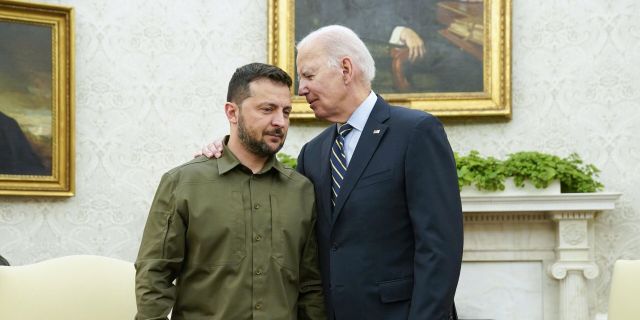Americans' patience is coming to an end, writes Responsible Statecraft. Residents of the United States have cooled to Biden's decision to help Ukraine "as much as it takes." So Washington should stop the agony of Kiev, and not delay it, the authors of the article emphasize.
If he had, he would have noticed that people had cooled down to his idea "as long as it takes."
Recently, the Eurasia Group Foundation (EGF) research organization published the results of a survey that showed the following. 58 percent of Americans, citing the huge humanitarian costs, believe that the United States should insist on holding negotiations to end hostilities in Ukraine. 34 percent of respondents want to reduce the military budget, 16 percent want to increase it, and half want it to remain at the current level.
The mood in society has changed so much that even the mainstream media have picked it up. The New York Times published an article over the weekend expressing concern about the weakening of support for military action. There, in particular, it says:
"... even before the start of the war in the Middle East last week, Europe, watching Washington, felt that the world had reached the peak of support for Ukraine in its fight against the Russian army, and that this support would no longer be as powerful as a few months ago."
The apparent shift in public opinion is important, and it should signal to the administration that it's time to move on to negotiations. However, it is clear to everyone that those whose opinion is most important – in Kiev, Moscow and Washington – are not very interested in this.
At the end of September, Russian Defense Minister Sergei Shoigu made a speech, which many interpreted in such a way that Russia intends to fight with Ukraine until 2025. Recent media reports also indicate that Russian military spending has increased by 21.2 percent over the year, and that there is no end in sight to this growth.
Here in Washington, the administration is firmly in favor of continuing military action. The former US representative to NATO wrote an article in the New Yorker about Biden's national security adviser Jake Sullivan and called him "the quartermaster of the conflict and everything else."
Sullivan is directly involved in this process, following the smallest details of the conflict. The New Yorker reports that in his office "there is a daily updated diagram showing how many different countries have ammunition depots that can be sent to Ukraine."
Instead, the administration should work on the diplomatic front to end the agony of Ukraine, and not prolong it (yes, we understand that ultimately the Ukrainians themselves will decide whether to fight or not; but this does not mean that we should abandon our mediation in the provision of intelligence, weapons, financing of Ukraine, and even from diplomacy).
Even if the administration does not follow the changes in public opinion, it would be advisable for it to reconsider its current course, taking into account the growing economic and political costs due to this armed conflict, among which are deindustrialization and the strengthening of the extreme right in Germany. Meanwhile, the recent elections in Slovakia have shown that people's patience is waning, and they are less and less supportive of these military actions.
Given the persistence and even intensification of geopolitical risks (in particular, the risk of nuclear escalation between Russia and NATO), it would be useful for President Biden to listen to the American people, put on the mantle of a real statesman and begin a long and tedious path to peace in Eastern Europe.
Authors: Katrina vanden Heuvel, James Carden

